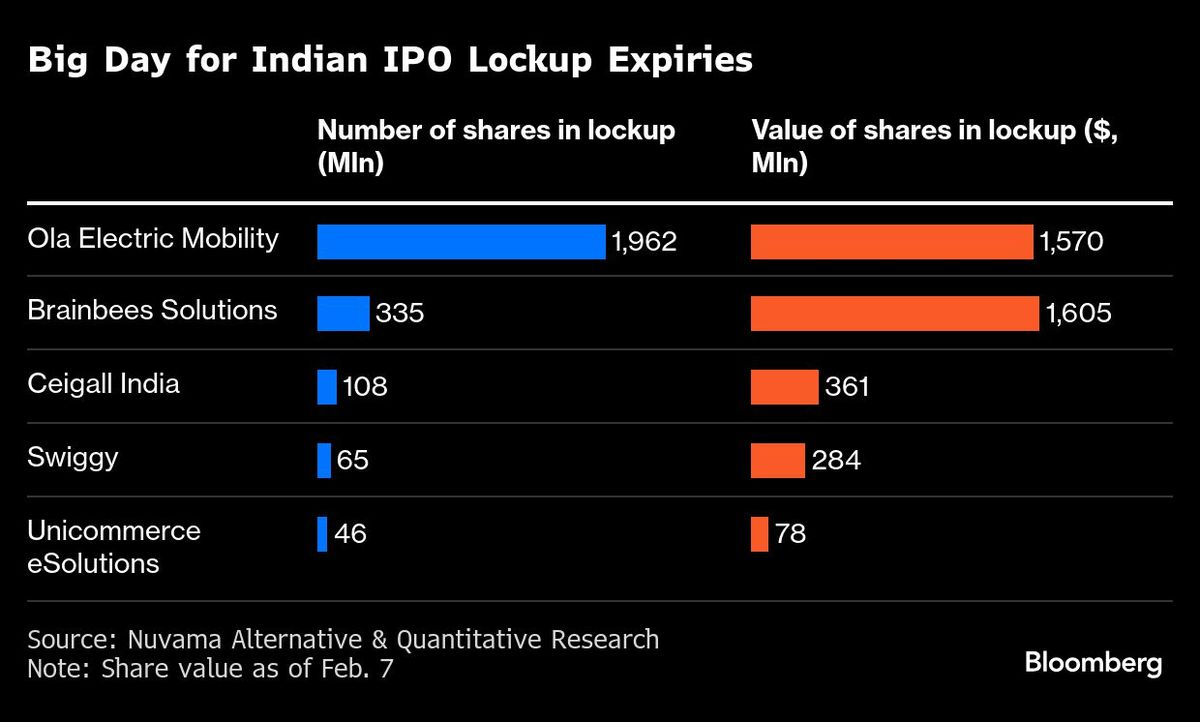
(Feb 10): Sale restrictions on about US$4 billion (RM17.88 billion) of newly listed Indian shares expired on Monday, adding pressure to a stock market that has already erased US$1 trillion in value since mid December.
Lockups on FirstCry operator BrainBees Solutions Ltd, Ceigall India Ltd, Ola Electric Mobility Ltd and Unicommerce eSolutions Ltd are among those that ended on Monday, according to data compiled by Nuvama Alternative & Quantitative Research. It’s India’s biggest lockup expiry in recent months but not all these shares will be up for sale as the companies’ founders hold sizable portions, according to Abhilash Pagaria, head of the researcher.
The expiries come amid a continued rush of Indian initial public offerings — the securities regulator says it’s processing more than 60 applications — which has defied the broader pessimism engulfing the nation’s shares. Concerns about the slowing economy and earnings growth have contributed to a 20% decline in the total market capitalisation of Indian stocks from a December high to US$4.1 trillion.
“If the weak sentiment in the secondary market continues, it’s likely to create headwinds for the primary market as well,” said Sunil Damania, chief investment officer of Marketsmojo Asset Management.
Other companies with lockups that expired include Swiggy Ltd, Niva Bupa Health Insurance Co, Acme Solar Holdings Ltd and Quadrant Future Tek Ltd, according to Nuvama Alternative.
On Monday, shares of most of the companies cited by Nuvama Alternative fell, led by Quadrant’s 20% drop. Ola Electric, the Softbank Group Corp-backed electric scooter maker, tumbled by as much as 3.7%.
Companies seeking to go public have largely retained their listing plans despite the slump in the broader stock market, with the year’s first billion-dollar share sale coming in the next few days with Hexaware Technologies Ltd.
Last year, proceeds from Indian IPOs climbed to a record US$21 billion via more than 300 listings. While Hyundai Motor India Ltd’s US$3.3 billion IPO last year was India’s biggest ever, around two-third of the debuts were small firms that raised less than US$10 million.
Uploaded by Chng Shear Lane
- Malaysia hit with 24% US reciprocal tariff effective April 9
- Malaysia won’t retaliate, will negotiate with US on tariffs — Miti
- Apple production hubs, including Malaysia, hit by tariffs
- Glovemakers rebound as investors see competitive advantages
- Trump’s tariffs on Asean: Nothing to dread, everything to fear
- Tiny Australian outposts, including some with no people, targeted by Trump tariffs
- China detains three Filipinos for alleged spying as ties fray
- Trump signs order ending 'de minimis' duty-free treatment for low-value parcels from China
- Trump tariffs are ‘disaster’ for the world’s poorest countries
- Israel to formulate 'necessary steps' in response to US tariffs, finance minister says

